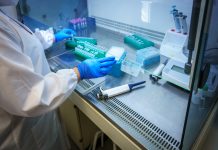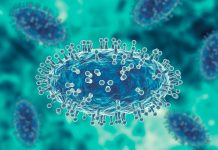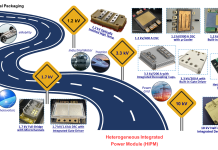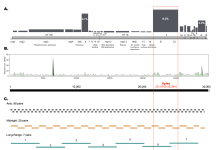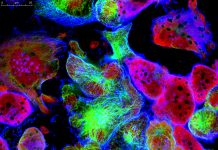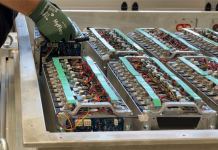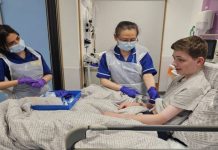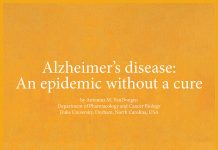Open Access Government produces compelling and informative news, publications, eBooks, and academic research articles for the public and private sector looking at health, diseases & conditions, workplace, research & innovation, digital transformation, government policy, environment, agriculture, energy, transport and more.
Home Search
node - search results
If you're not happy with the results, please do another search
Are swollen lymph nodes normal after getting the COVID vaccine?
According to radiologists at Massachusetts General Hospital (MGH), swollen lymph nodes after COVID vaccination are a "normal reaction that typically goes away with time".
Science Platform Sustainability 2030: Bridging science and policy for sustainable transformation
Julian Trutz Müller, a Scientific Officer at GERICS/wpn2030, discusses the importance of bridging science and policy for sustainable transformation, using the case study of the Science Platform Sustainability 2030 (wpn2030).
ECU researchers turn to AI to overcome solid-state battery challenges
Edith Cowan University (ECU) researchers are advancing the future of clean energy storage by using artificial intelligence to address one of the most significant barriers to solid-state batteries reaching large-scale production.
UK confirms first case of dangerous clade‑1b mpox strain
The UK Health Security Agency (UKHSA) has confirmed the first UK case of the more serious Mpox virus “clade Ib” strain.
Why Europe cannot afford to overlook public transport
Thomas Lymes at Eurocities, explains why Europe cannot afford to neglect public transport and discusses its funding potential.
Fueling bone regeneration by rewriting immune metabolism
Chima V. Maduka, DVM, MS, PhD, and Christopher H. Contag, PhD, provide insights on tuning immunometabolism to resolve inflammation and promote repair at the bone–biomaterial interface.
Power electronic modules form the basis of grid modernization
H. Alan Mantooth, Distinguished Professor at the University of Arkansas, guides us through power electronic modules, which form the basis of grid modernization.
What can we learn from millions of viral genome sequences?
David Ussery and Pratul Agarwal, Professors in the Department of Physiological Sciences at Oklahoma State University, discuss their work using high-performance computing for the analysis of millions of viral genome sequences.
Advancing rare diseases care
Lorna Rothery spoke with Victoria Hedley, co-lead of the Rare Disease Research UK Hub, about initiatives aimed at advancing the agenda for rare diseases, as well as the importance of facilitating cross-border collaboration to promote best practices and advance critical research.
Lighting the way to cancer surgery
By decoding the subtle timing of light, scientists could give surgeons sharper vision in the operating room – and patients a brighter outlook beyond it.
Delivering the power of location data for public sector impact
IT and business consulting services firm CGI outlines the importance of geospatial data for modern government operations, emphasising its role in enhancing decision-making across various sectors.
Shaping the future of circular and sustainable urban mobility
Advancing circular and sustainable urban mobility and logistics are essential for the future of Europe’s green transition and achieving the European Union’s (EU) climate neutrality goal by 2050, as highlighted here by Irene Jubany from the Eurecat Technology Centre.
World’s first gene therapy for p47 Chronic Granulomatous Disease developed by UCL and GOSH
UCL and Great Ormond Street Hospital have developed the world's first gene therapy for p47 Chronic Granulomatous Disease.
University of Warwick develops quantum diamond sensor for cancer detection
Researchers at the University of Warwick have created a quantum diamond sensor, a diamond-based magnetometer capable of accurately detecting cancer cells.
Alzheimer’s disease: An epidemic without a cure
Researchers are investigating the continued ineffectiveness of amyloid-targeting therapies which points to either flaws in the amyloid cascade hypothesis, or its application in drug development – but what can be done to help? And what can ARC do?
AI-driven cloud edge innovations take centre stage at ICE2025
The International Conference on Engineering, Technology, and Innovation (ICE2025) brought together a diverse group of innovators and researchers from across Europe to discuss the future of digital transformation.
Purple phototrophic bacteria and microbial electrochemical technologies: A new biorefinery concept for wastewater treatment
The shift towards sustainable wastewater treatment focuses on nutrient recovery through biorefineries, highlighting the importance of microalgae, cyanobacteria, and, more recently, purple phototrophic bacteria for their metabolic flexibility and adaptability.
Department of Chemical Engineering at the University of Patras
Developing chemical engineers educated in research, development and optimisation of production of industrial products and materials.
APOE protein variants affect microglia response in Alzheimer’s disease
A new study investigates how APOE isoforms differentially affect human microglia function in Alzheimer's disease.
Rethinking papillary thyroid cancer: Why “low risk” isn’t always low impact
Oliver Bathe, Professor of Surgery and Oncology at the University of Calgary and CEO of Qualisure Diagnostics, urges us to rethink papillary thyroid cancer, noting that “low risk” isn’t always synonymous with low impact.

